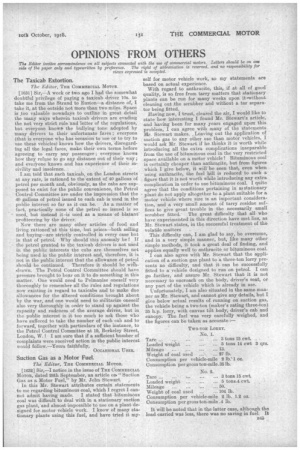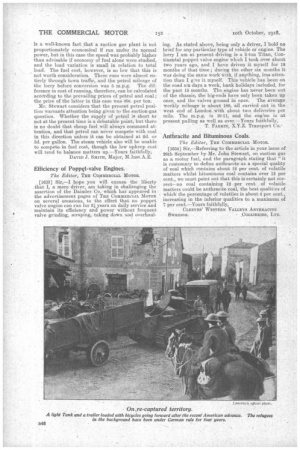OPINIONS FROM OTHERS
Page 19

Page 20

If you've noticed an error in this article please click here to report it so we can fix it.
Ths Editor invites correspondence on all subjects connected with the use of commercial motors. Letters should be on one side of the paper only and typewritten by preference. The right of abbreviation is reserved, and no responsibility for views expressed is accepted.
The Taxicab Extortion.
The Editor, THE COMMERCIAL MOTOR.
[1631] Sir,—A week or two ago I had the somewhat doubtful privilege of paying a. taxicab driver 10s. to take me from the Strand to Euston—a distance Of, I take it, at the outside not more than two miles. Space is ,too valuable nowadays to outline in great detail the many ways wherein taxicab drivers are evading the not very strict rule and letter of the regulations, but everyone knovifr the bullying• tone adopted by many drivers to their unfortunate fares ; everyone (that is everyone who has occasion to use or to try to use these vehicles) knows how the drivers, disregarding all the legal fares, make their own terms before agreeing to carry any passenger ; everyone knows how they refuse to go any distance out of their way ; and everyone knows and has experience of their incivility and insolence.
lam told that each taxicab, on the London streets at any rate, is rationed to the extent of 40 gallons of petrol per month and, obviously, as the cabs are supposed to exist for the public convenience, the Petrol Control Committee are under the impression that the 40 gallons of petrol issued to each cab is Used in the public interest so far as it can be. As a matter of fact, practically none of the petrol so issued is so used, but instead it used as a means of blatant profiteering by the driver.
Now there are many other articles of food and living rationed-at this time, but prices—both selling and buying—are strictly controlled in every case but in that of petrol. Why should this anomaly be ? If the petrol granted to the taxicab drivers is not used in the public interests the cabs are themselves not being used in the public interest and, therefore, it is not in the public interest that the allowance of petrol should be continued. Therefore it should be -withdrawn. The Petrol Control Committee should have pressure brought to bear on it to do something in this matter. One would need to Pelmanise oneself very thoroughly to remember all the rules and regulations now existing in regard to taxicabs and to make due allowances for the altered conditions brought about by the war, and one would need to militarize oneself also very thoroughly in order to stand up against the rapacity and rudeness of the average driver, but in the public interest is it too much to ask those who have suffered to take the number of each cab and to forward, together with particulars of the instance, to the Petrol Control Committee at 19, Berkeley Street, London, W..? I am sure that if a sufficient %umber of complaints were received action in the public interest would follow.—Yours faithfully,
OCCASIONAL USER.
Suction Gas as a Motor Fuel.
The Editor, THE COMMERCIAL MOTOR.
[1632] Sir,—I notice in the issue of THE COMMERCIAL MOTOR, dated 26th September, an article on. " Suction Gas as a Motor Fuel, by Mr. John Stewart. , In this Mr. Stewart attributes certain statements to me regarding bituminous coal, which I regret I cannot admit having made. I stated that bituminous coal was difficult to deal with in a stationary suction gas plant, and almost impossible to use on a plant designed for motor Vehicle Work. I know of many stationary plants using this fuel, and have tried it my self for motor vehicle work, SD my statements are based on actual experience. With regard to anthracite, this, if at all of good. quality, is so free from tarry matters that stationary plants can be run for many weeks upon it-without cleaning out the scrubber and without a tar separator being fitted. Having now, I trust, cleared the air, I would like to state how interesting I found Mr. Stewart's article, and having been for many years engaged upon this problem, I can agree with many of the statements Mr. Stewart makes. , Leaving out the application of suction gas to any other use than motor vehicles, I would ask Mr. Stewart if he thinks it is worth while introducing all the extra complications inseparable from the use of bituminous coal in the very restricted space available on a. motor vehicle? Bituminous coal is certainly cheaper than anthracite, but from figures which I give below, it will be seen that, even when using anthracite, the fuel bill is reduced to such a figure that it is not worth while introducing any extra complication in order to use bituminous coal. I quite agree that the conditions pertaining in af stationary plant do not apply altogether to a plant suitable for a motor vehicle where size is an important consideration, and a very small amount of tarry residue suffices to give great trouble in the necessarily small scrubber fitted.The great difficulty that all who have experimented in this direction have met lies, as Mr. Stewart states, in the successful treatment of the volatile matters This difficulty can, I am glad to say, be overcome, . and in a very simple manner, but, like many other simple methods, it took a great deal of finding, and applies equally well to anthracite or bituminous coal. I can also agree with Mr. Stewart that the application of a suction gas plant to 'a three-ton lorry presents no difficulty, and that it can be successfully fitted to a vehicle designed to run on petroL I can go further, and assure Mr. Stewart that it is not necessary to encroach on the body, driver's seat, or any part of the vehicle which is already in use.
Unfortunately, I am also situated in the same manner as Mr. Stewart, and cannot give any details, but I give below actual results of running on suction gas, the vehicle being a two-ton (maker's rating three-ton) 35 h.p. lorry, with canvas tilt body, driver's cab and canopy. The fuel was very carefully weighed, and the figures can be taken as accurate :—
TWO-TON LORRY.
Weight of coal used ... 104 lb. Consumption per vehicle-mile 2 lb. 1.2 oz. Consumption per gross ton-mile .4 lb.
It will be noted that in the latter case, although the load carried was less, there was no saving in fuel. It • B-15 is a well-known fact that a suction gas plant is not proportionately economical if run under its nermal power, but in this case the speed was probably higher than advisable if economy of fuel alone were studied, and the load variation is small in relation to total load. The fuel cost, however, is so low that this is not worth consideration. These runs were almost entirely through town traffic, and the petrol mileage of the lorry before conversion was 5 m.p.g. The difference in cost of running, therefore, can be calculated according to the prevailing prices of petrol and coal ; the price of the latter in this case was 40s. per ton. • Mr. Stewart considers that the present petrol position warrants attention being given to the suction-gas question. Whether the supply of petrol is short or not at the present time is a debatable point, but there is no doubt that cheap fuel will always command attention, and that petrol can never compete with coal in this direction unless it can be obtained at 2d. or 3d. per gallon. The steam vehicle also will be unable to compete in fuel cost, though the low upkeep cost will tend to balance matters up.—Yours faithfully, DAVID J. Salem, Major, M.Inst.A.E.
Efficiency of Poppct-valve Engines.
The Editor, THE COMMERCIAL MOTOR.
[1633] Sir,—I hope you will excuse the liberty that I, a mere driver, am taking in challenging the assertion of the Daimler Co. which has appeared in the advertisement pages of THE COMMERCIAL MOTOR on several occasions, to the ellect that no poppet valve engine can run for years on daily service and maintain its efficiency and power -without frequent valve grinding, scraping, taking down and overhaul ing. As stated above, being only a driver, I hold no brief for any particular type of vehicle or engine. The lorry I am at present driving is a 2-ton Titan, Continental poppet valve engine which I took over about two years ago, and I have driven it myself for 18 months of that time ; during the other six months it was doing the same work with, if anything, less attention than I give it myself. This vehicle has been on the road six days a week, bank holidays included, for the past 15 months. The engine has never been out of the chassis, the big-ends have only been taken up once, and the valves ground in once. The average weekly mileage is about 180, all carried out in the west end of London With about two deliveries per mile. The m.p.g. is 1011, and the engine is at present pulling as well as ever.--Yours faithfully, T. FAnune, X.Y.Z. Transport Co.
Anthracite and Bituminous Coals.
The Editor, THE COMMERCIAL MOTOR.
[1634] Sir,---Referring to the article in your issue of 26th September 1-..y Mr. John Stewart, on suction gas as a motor fuel, and the paragraph stating that " it is customary to define anthracite as a special quality of coal which contains about 12 per cent. of volatile matters whilst bituminous coal contains over 12 per cent., we must point out that this is certainly riot correcb—no coal containing 12 per cent., of volatile matters could be anthracite coal, the best qualities of which the percentage of volatiles is about 4 per cent., increasing in the inferior -qualities to a maximum of 7 per cent.—'Yours faithfully,
CLEEVES' WESTERN VALLEYS ANTHRACITE
Swansea. • .COLLIERIES, LTD.






















